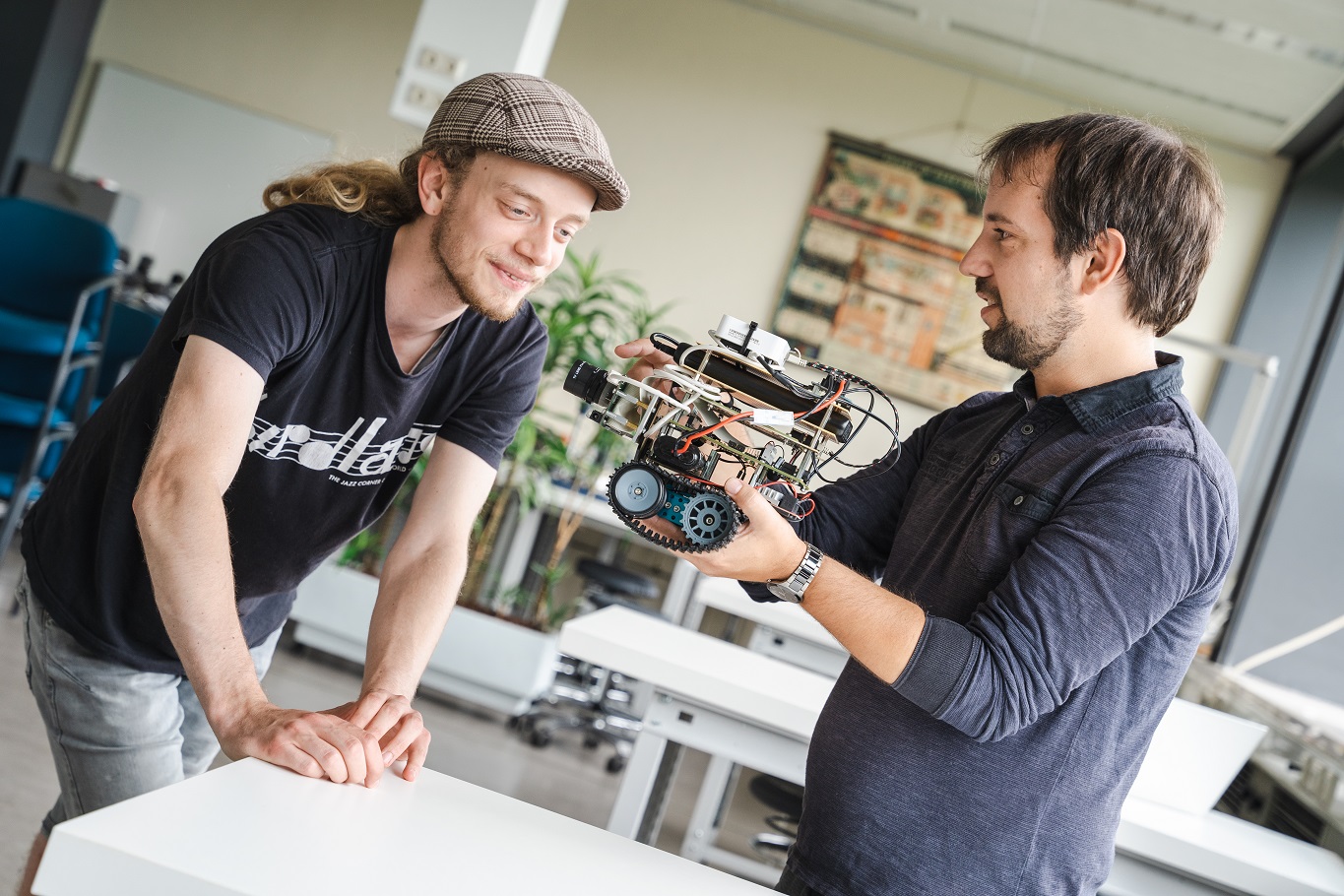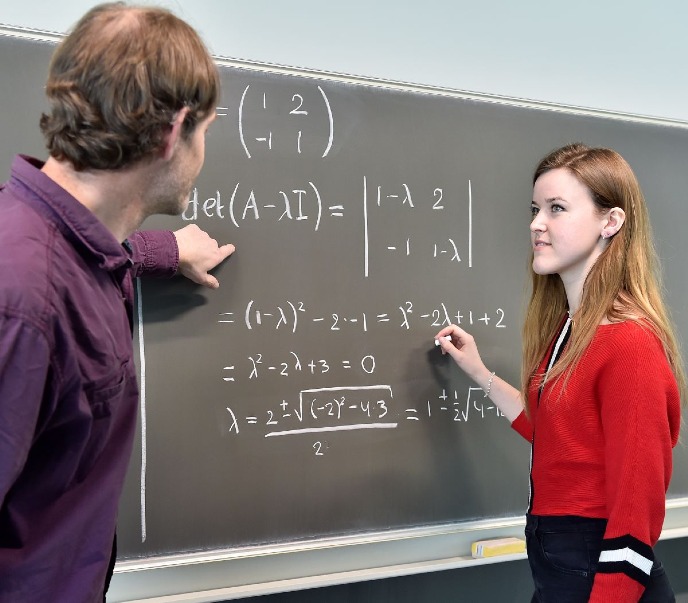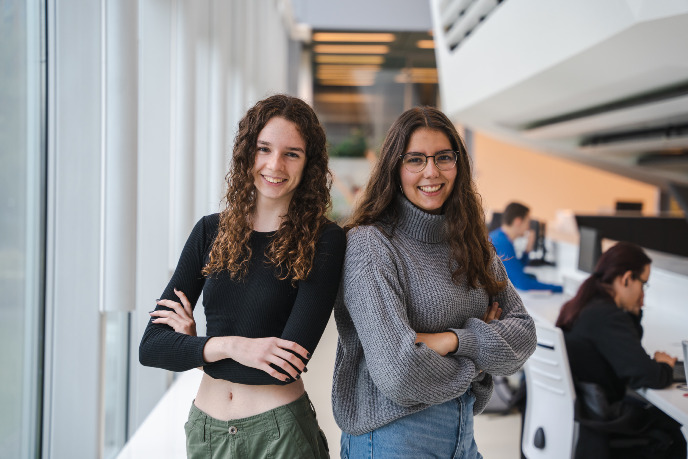Double Degree Mathematics-Physics

For dedicated and highly motivated students, we offer the opportunity to study both Mathematics and Physics. This means that you follow two degree programmes at the same time, which would typically result in two times 180 EC’s.*
However, our double degree programme is structured in such a way that the overlap between the two degree programmes is taken into account resulting in a programme of 250 EC’s. In the final year, you conduct one Bachelor’s research project that is relevant to both programmes, worth 20 EC’s as opposed to conducting two regular projects worth 15 EC’s.
* 1 EC is the equivalent of 28 hours of study (preparing for and attending classes, tutorials, self study etc). A 180 EC programme is structured in three years of 60 ECs.
For whom?
-
You are dedicated and highly motivated
-
You are theoretically inclined and have a passion for both mathematics and physics
-
You can manage a heavy workload
-
You are prepared to spend extra time on your studies and realize that you sometimes might have to sacrifice other activities
-
You are independent and have outstanding studying and planning skills
-
You can handle suboptimal and/or conflicting schedules
Two Bachelor’s degree programmes
The entire programme per year can be found on Ocasys, the online course catalog of the university.
This schedule shows you the planning to finish the double degree within 3 years. However, due to the high workload, we recommend making your own planning spread out over 4 years, as we rarely see the full programme finished in 3 years. Please be aware that a 4th year means you will have to pay an additional year's tuition fee.
Please note that this programme combines Mathematics and Physics, not Applied Mathematics and Applied Physics. Combining the latter two programmes will result in a much higher workload in EC’s and is therefore not offered as a double degree structured programme. Our advice is to start with Mathematics and Physics, and if it turns out that you like Applied Mathematics or Applied Physics more, make an appointment with the academic advisor and discuss your planning.
Time table
During the programme, you will experience overlap between lectures, tutorials and sometimes even exams or resits, or multiple exams or resits on one day. We try to avoid overlap in exams as much as possible, but it is impossible to completely avoid this situation. Overlap between lectures and tutorials are the students own responsibility and they are expected to prioritize and plan accordingly. This means that you cannot follow all lectures and tutorials, resulting in more self study.
BSA
You will be issued a binding study advice at the end of your first academic year. You will receive a positive study advice if you have earned at least 45 EC’s for one of the two Bachelor’s degree programmes.
Therefore, we recommend you to focus on one of the programmes in the first year, to make sure that you earn enough EC’s for at least one of them. If you obtain more than 45 ECTS overall, but do not meet the BSA criteria for either of the two programmes, you will receive a negative binding study advice for both programmes.

Admission
To be registered for the double degree means that you have to be registered for the two programmes separately. This means that you need to enter the admission process for both programmes separately. Be aware that different requirements apply for Physics and Mathematics. You have to meet the admission requirements for both degree programmes.
You can find the requirements on the regular programme pages:
Application
You need to apply online in Studielink for both degree programmes. You do not need to ask for permission from the academic advisor in advance. Before you start a Bachelor’s degree programme, you need to make sure that you choose the programme that suits you best in terms of difficulty and content.
Are you already following either the Mathematics or Physics programme, and would you like to add another degree programme? In this case, contact your academic advisor, as it is not possible to start a second programme in the middle of the academic year. It is possible to discuss whether you could already join some course units, and together you can set up a good plan.
Tuition fees
Please be aware that, depending on your situation, the tuition fee can be different for two registrations compared to one registration.
“At the start it was a lot of pressure. But what is really nice about following both programmes is that the physics adds to your maths knowledge and vice versa.”

Inés Desojo Garcia & Maria Diaz Marrero - following the double degree programme in four years.
Inés: In secondary school, I already knew that I wanted to study maths, but I was afraid that I would miss physics a lot. So I hesitated for a long time, and came to the conclusion that I actually wanted to study both. I couldn't find an appealing way of combining the two in Spain, so I looked further afield and settled on Groningen.
Maria: I also wanted to study mathematics, and a friend who was already living in the Netherlands told me that Groningen was a really nice university city. I saw that you could combine maths with physics, and I wanted to try that. At the start it was a lot of pressure. But what is really nice about following both programmes is that the physics adds to your maths knowledge and vice versa.
Inés: The amount of time you spend studying varies per block. But if you follow four course units per block, both lectures and tutorials, you will already have 32 contact hours per week. Then there is self-study on top of that. We both keep track of that. At school, I could sometimes do all my work at the last minute, but that is no longer possible.
Maria: You obviously have more exams as well. You are always the first to have exams in the exam period, you are the last to finish, and you have less time to prepare in between than the students who only study mathematics or physics. You also need to be good at organizing your work: for example, if you have overlapping tutorials and you need to cover one by getting someone else’s notes. It is important to be able to prioritize well.
But it’s doable, we have time left for holidays and a social life. Things can also work out conveniently: sometimes we study together in a group in the library and do something fun together after, once we’re done.
Inés: It can be quite overwhelming when you start. But don’t lose heart; sometimes it just takes a while to figure out how to manage this combination successfully. And you won’t understand some course units at first, but in the end it all comes together.
Maria: Exactly, don’t feel stupid. Give yourself time, be patient. If you work hard, you’ll make it.
FAQ
How do I apply for the double degree programme in Physics and Mathematics?
You need to apply for both programmes separately via Studielink. There is no option to apply for the double degree programme as this programme is not an official programme. It is an efficient way to combine courses from both the Physics and Mathematics curriculum.
Will I obtain one degree certificate?
No, since the programme is not an official programme, after finishing the complete programme you will receive two degree certificates, one for Physics and one for Mathematics.
What are the disadvantages of following this double degree programme?
-
In the timetable you will experience overlap between lectures, tutorials and sometimes even exams or resits (see explanation above).
-
Curriculum changes in the Physics and Mathematics programme might affect your planning more than if you are studying one degree. This requires the ability to cope with unexpected changes in your study planning.
-
The order of the courses might be different than if you would follow one degree. This sometimes means that you need to follow a more advanced course, without having obtained all the assumed prior knowledge. We expect double degree students to be able to manage this.
What does my introduction week look like?
We try to avoid overlap of the introduction lectures to enable you to attend the introductions for both programmes.
During the introduction week, the mentor groups will begin with the first meetup. A mentor is an senior student, who guides and supports first year students during the start up phase at university. In the weeks leading up to the start of the year, you will be asked to sign up for the mentoring system. Make sure you sign up for either the mentor system of Mathematics or Physics (don’t sign up for both!). We advise you to sign up for the mentor system of the programme that you have chosen as your priority.
How does the BSA apply to this double degree programme?
You will be issued a binding study advice at the end of your first academic year. You will receive a positive study advice if you have earned at least 45 EC’s for one of the two programmes.
We recommend you to focus on one of the programmes in the first year, to make sure that you earn enough EC’s for at least one of them. If you receive a negative BSA, this counts for both programmes.
Do I need to prioritize one of the programmes?
Yes, we advise students to prioritize one of the programmes. We often see that after having experienced the intensity of the double degree program, students decide to continue with only one of the degree programmes.
If you know your priority from the start, it will be easier to continue with one degree should you decide to do so.
Can I start with one degree in my first year and start the second degree later?
Yes, you can. Please be aware that if you follow the first year of one of the degree programmes, you will follow courses that are not part of the first year of the double degree programme. And in case you will start with Physics in your first year, make sure to include the right Mathematics courses that are mandatory in the double degree programme. Make sure to discuss this with the academic advisor from Physics.
Not all students are aware from the start that they want to take the double degree, make sure to contact the academic advisor as soon as you are considering starting the double degree. In case you did not follow the right courses, the academic advisor will guide you in the steps you need to take.
Can I quit the double degree programme and continue with just one programme?
Yes, this happens every year. Depending on the courses that you have finished, they either have or don’t have a place in the programme that you want to continue with.
Plan a meeting with the academic advisor of the programme that you want to continue with to determine the consequences for you and which steps you need to take.
I quit one of the programmes, what happens with my extra courses?
That depends on the courses. Some courses might be used in the minor space of the programme that you continue with, other courses might be added as extra-curricular.
This is typically decided by the Board of Examiners. Make sure to contact the academic advisor first, they will guide you in the process.
Who is the academic advisor of this programme?
Both the academic advisor for Mathematics and the one for Physics are available for double degree students.
The Mathematics academic advisor can help with questions related to the Mathematics courses of the programme, and the Physics academic advisor can help with the Physics courses. For general questions it is advised to contact the academic advisor of the programme you have chosen as your priority.
Can I combine Mathematics or Physics with other degree programmes?
There are no other double degree programmes. Therefore, combining Mathematics or Physics with a different degree programme may imply taking two full degree programmes amounting to 2x180 = 360 ECs of workload. Contact your academic advisor to discuss if you want to combine other programmes.
